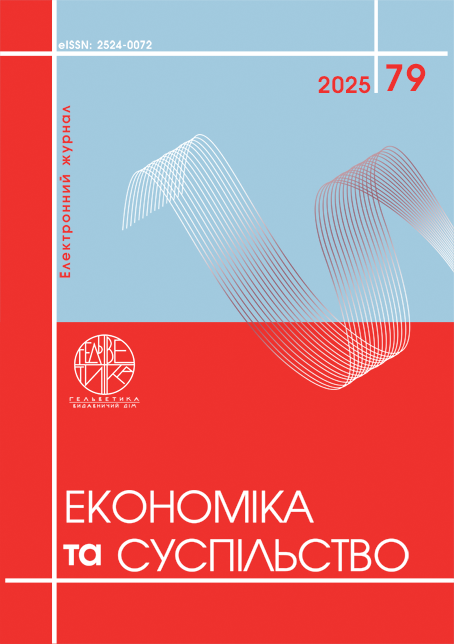THE EMPLOYER BRAND RISK RESILIENCE DIAGNOSTICS: METHODICAL APPROACH
Abstract
The article substantiates the need for conducting the employer brand risk resilience diagnostics. The author analyzes science literature. The result allowed to determine the company’s employer brand risk resilience as a complex concept. It characterizes the employer brand’s management system’s quality and reliability. It also implies the ability to achieve planned development indicators and withstand the negative impact of destabilizing factors, phenomena and processes. The author proposes the methodical approach to diagnostics. It involves determining the integral indicator of the risk tolerance of the company's employer brand based on the calculation of: the quality coefficient (reflects the adequacy of the company's internal potential in terms of employer brand attributes), the internal vulnerability coefficient (reflects the degree of influence of the company's internal risks on the level of employer brand development) and the external threat coefficient (reflects the negative impact of external factors on maintaining the level of development of the employer brand ) of the employer brand. For each coefficient, the composition of indicators and the algorithm for their evaluation are determined. The study identifies a list of internal vulnerability factors (internal risks) for each of the employer brand attributes (organizational, functional, economic and psychological). It also identifies a list of external threat factors (external risks). It should be noted that external threats affect the overall state and level of development of the employer brand, i.e. they affect each of the attributes with equal force. In order to determine the qualitative identification of the company's employer brand risk resilience level, a scale has been proposed. It includes three levels (green, yellow and red zone). Proposed methodical approach will allow you to assess the overall level of the employer brand risk resilience. And also based on cause-and-effect relationships, identify bottlenecks and make appropriate management decisions. They will improve the level of the employer brand development in the long term.
References
Білорус Т.В., Фірсова С.Г. Методичний інструментарій оцінювання рівня розвитку бренду компанії роботодавця. Економічний журнал Одеського політехнічного університету. 2019. № 4(10). С. 30-39. DОІ: https://doi.org/10.5281/zenodo.3834923
Білорус Т.В., Фірсова С.Г. Сутнісна характеристика категорії «бренд роботодавця». Теорія та практика управління розвитком економіки: матеріали міжнар. наук-практ. конф.(м. Київ, 2019). С. 316-318. URL: http://magazine.faaf.org.ua/images/stories/zb_conference/zb_conf_10-10-2019.pdf
Гривківська, О. В., Дух В.М. Методичний підхід до визначення ризикостійкості підприємства у забезпеченні ефективної його діяльності в умовах невизначеності. Економіка і управління. 2023. №1. С. 22-27. URL: https://dspace.nuft.edu.ua/handle/123456789/40966
Гросул В. А., Усова М. О. Методичні аспекти оцінки рівня ризикостійкості підприємства роздрібної торгівлі. Український журнал прикладної економіки та техніки. 2024. № 9(1). С. 282–286. DOI: https://doi.org/10.36887/2415-8453-2024-1-48
Касмініна К.О., Кулакова С.Ю. Ризикостійкість підприємства як передумова його розвитку: сутність та індикатори. Агросвіт. 2016. № 12. С. 60-64. URL: http://www.agrosvit.info/pdf/12_2017/8.pdf
Kulakova S.Yu., Chevhanova V.Ya., Stetsenko Yu.V. The Evaluation of the Risk Tolerance Impact on the Enterprise Efficiency. Економіка і регіон. 2021. № 3 (78). С. 28-39. DOI: https://doi.org/10.26906/EIR.2020.3(78).1994
Kulakova S.Yu. Siora R. Methodological Approaches to Assessing the Level of Enterprise Risk Resistibility. Економіка і регіон. 2019. № 4(7). С. 121-128. DOI: https://doi.org/10.26906/ЕІР.2019.4(75).1860
Руденко С.В. Організаційно-економічні засади ризикостійкості у системі антикризового управління діяльністю підприємств. Розвиток бізнесу в контексті європейської інтеграції: глобальні виклики, стратегічні пріоритети, реалії та перспективи : матеріали Міжнар. наук.-практ. конф. (м. Харків, 07 черв. 2024 р.) Харків : ДБТУ, 2024. С. 117-118. DOI: https://doi.org/10.5281/zenodo.11916196
Харченко Т.М., Шестакова А.В. Роль ризик-менеджменту на підприємствах за сучасних умов господарювання. Український журнал прикладної економіки. 2019. № 4 (1). С. 135–142. URL: http://ujae.org.ua/rol-ryzyk-menedzhmentu-na-pidpryyemstvah-za-suchasnyh-umov-gospodaryuvannya/
Bіlorus T. V., Firsova S. G. (2019) Metodychnyi instrumentarii otsiniuvannia rivnia rozvytku brendu kompanii robotodavtsia [Methodical tools for evaluating the level of brand development of the employer's enterprise]. Ekonomichnyi zhurnal Odeskoho politekhnichnoho universytetu – Economic journal Odessa polytechnic university, vol. 4(10), pp. 30–39. DОІ: https://doi.org/10.5281/zenodo.3834923
Bilorus T.V., Firsova S.G. Sutnisna kharakterystyka katehorii «brend robotodavtsia» [Essential characteristics of the category "brand of the employer"]. Teoriia ta praktyka upravlinnia rozvytkom ekonomiky: materialy mizhnar. nauk-prakt. konf. (m. Kyiv, 2019), pp. 316-318. (in Ukrainian). Available at: http://magazine.faaf.org.ua/images/stories/zb_conference/zb_conf_10-10-2019.pdf
Hryvkivska, O. V., Dukh V.M. (2023) Metodychnyi pidkhid do vyznachennia ryzykostiikosti pidpryiemstva u zabezpechenni efektyvnoi yoho diialnosti v umovakh nevyznachenosti [Methodological approach to determining the risk tolerance of an enterprise in ensuring its effective activity in conditions of uncertainty]. Ekonomika i upravlinnia – Economics and Management, vol. 1, pp. 22-27. Available at: https://dspace.nuft.edu.ua/handle/123456789/40966
Hrosul V., Usova M. (2024) Methodological aspects of assessing the level of risk resistance of retail trade enterprises [Methodological aspects of assessing the level of risk of a retail enterprise]. Ukrainian journal of applied economics and technology – Ukrainian Journal of Applied Economics and Technology, vol. 9(1), рр. 282–286. DOI: https://doi.org/10.36887/2415-8453-2024-1-48
Kasminina, K.O., Kulakova, S.Yu. (2016) Risk resistance of the enterprise as a prerequisite for its development: essence and indicators [Enterprise risk tolerance as a prerequisite for its development: essence and indicators]. Ahrosvit – Agrosvit, vol. 12, рр. 60-64. Available at: http://www.agrosvit.info/pdf/12_2017/8.pdf
Kulakova S.Yu., Chevhanova V.Ya., Stetsenko Yu.V. (2021) The Evaluation of the Risk Tolerance Impact on the Enterprise Efficiency. Ekonomika i rehion – Economy and region, vol. 3 (78), pp. 28-39. DOI: https://doi.org/10.26906/EIR.2020.3(78).1994
Kulakova S.Yu. Siora R. (2019) Methodological Approaches to Assessing the Level of Enterprise Risk Resistibility. Ekonomika i rehion – Economy and region, vol. 4 (7), pp. 121-128. DOI: https://doi.org/10.26906/ЕІР.2019.4(75).1860
Rudenko S.V. (2024) Orhanizatsiino-ekonomichni zasady ryzykostiikosti u systemi antykryzovoho upravlinnia diialnistiu pidpryiemstv [Organizational and economic principles of risk tolerance in the system of anti-crisis management of enterprise activities]. Rozvytok biznesu v konteksti yevropeiskoi intehratsii: hlobalni vyklyky, stratehichni priorytety, realii ta perspektyvy: materialy Mizhnar. nauk.-prakt. konf., (Kharkiv, June 07, 2024). Kharkiv : DBTU, pp. 117-118. (in Ukrainian). DOI: https://doi.org/10.5281/zenodo.11916196
Kharchenko, T.M., Shestakova A.V. (2019) Rol ryzyk-menedzhmentu na pidpryiemstvakh za suchasnykh umov hospodariuvannia [The role of risk management at enterprises under modern economic conditions]. Ukrainskyi zhurnal prykladnoi ekonomiky – Ukrainian Journal of Applied Economics, vol. 4(1), pp. 135–142. Available at: http://ujae.org.ua/rol-ryzyk-menedzhmentu-na-pidpryyemstvah-za-suchasnyh-umov-gospodaryuvannya/
Copyright (c) 2025 Тетяна Білорус

This work is licensed under a Creative Commons Attribution 4.0 International License.


